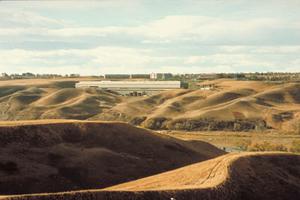
University of Lethbridge
The University of Lethbridge in LETHBRIDGE, Alberta, was established in 1967. The university has always been student centred with undergraduate programs in arts and science, education, fine arts, management, and health sciences. Comparatively small classes and an emphasis on LIBERAL EDUCATION are the hallmarks of the University of Lethbridge experience. All undergraduates are required to fulfill a liberal education requirement with exposure to fine arts, humanities, social sciences, and sciences. The University of Lethbridge is a "destination university" with some 65% of the students at the Lethbridge campus now coming from outside the city. The School of Graduate Studies was created in 2001 and graduate student enrolments are growing steadily. In addition to granting master's degrees in arts, science, education, management, counselling, fine arts, and music, a doctoral program was inaugurated in 2001 with the first PhD degree conferred in 2004.The university grew out of the University Section of Lethbridge Junior College (now Lethbridge College), and in 1971 it moved to a new 185 ha campus on the west side of the Oldman River Valley. University Hall, the first academic building, was designed by Arthur ERICKSON to harmonize with the prairie horizon and span the coulees leading down to the river. Since 2001, student enrolments expanded from 7 000 to nearly 8 500 of which over 500 are graduate students. The original "campus in the coulees" in West Lethbridge has seen considerable growth and development but the university has also added a new building in downtown Lethbridge to enhance its connections with the local community and expanded its Calgary and Edmonton campuses which are geared to part-time students in Management.
The university is known for innovation in tertiary education. Its Native American Studies major was one of Canada's first, and the university now operates a bridging program to encourage the entry of First Nations, Metis, and Inuit students. The Bachelor of Fine Arts in New Media engages students in the use of computer-based digital media to create animations, three-dimensional models, and special effects in a new-age blend of art, drama, and music. The Bachelor of Health Sciences - Addictions Counselling is an innovative program offered through the Faculty of Health Sciences while the Masters of Counselling program offered through the Faculty of Education is one of the first of its kind. International affairs include a number of active exchange programs, most notably those offered by the Faculty of Management in support of its major in International Management. The university's most recent research initiatives include the Canadian Centre for Behavioural Neuroscience, the Alberta Water and Environmental Science Building, and the Prentice Institute for Global Population and Economy. While the university began as a primarily undergraduate institution, it is now developing into a comprehensive university with growing emphasis on research and graduate studies. Its motto is "Fiat lux" ("Let there be light") and the University of Lethbridge Pronghorns wear blue and gold.

 Share on Facebook
Share on Facebook Share on X
Share on X Share by Email
Share by Email Share on Google Classroom
Share on Google Classroom


